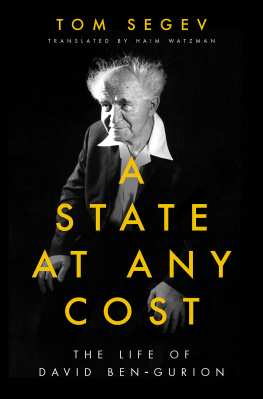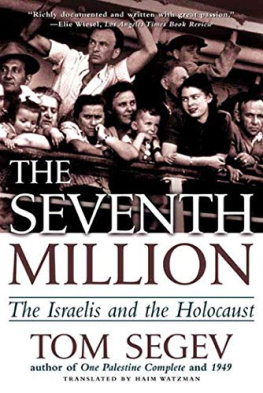Thank you for downloading this Simon & Schuster ebook.
Get a FREE ebook when you join our mailing list. Plus, get updates on new releases, deals, recommended reads, and more from Simon & Schuster. Click below to sign up and see terms and conditions.
CLICK HERE TO SIGN UP
Already a subscriber? Provide your email again so we can register this ebook and send you more of what you like to read. You will continue to receive exclusive offers in your inbox.
We hope you enjoyed reading this Simon & Schuster ebook.
Get a FREE ebook when you join our mailing list. Plus, get updates on new releases, deals, recommended reads, and more from Simon & Schuster. Click below to sign up and see terms and conditions.
CLICK HERE TO SIGN UP
Already a subscriber? Provide your email again so we can register this ebook and send you more of what you like to read. You will continue to receive exclusive offers in your inbox.
ALSO BY TOM SEGEV
Soldiers of Evil: The Commandants of the Nazi Concentration Camps
The Seventh Million: The Israelis and the Holocaust
One Palestine, Complete: Jews and Arabs Under the British Mandate
Elvis in Jerusalem: Post-Zionism and the Americanization of Israel
1967: Israel, the War, and the Year that Transformed the Middle East
Simon Wiesenthal: The Life and Legends
David Ben-Gurion: A State at All Costs

Free Press
An Imprint of Simon & Schuster, Inc.
1230 Avenue of the Americas
New York, NY 10020
www.simonandschuster.com
Copyright 1986 by The Free Press, an imprint of Simon & Schuster, Inc.
Preface copyright 1998 by Tom Segev
Introduction copyright 2008 by Tom Segev
All rights reserved, including the right to reproduce this book or portions thereof in any form whatsoever. For information, address Free Press Subsidiary Rights Department, 1230 Avenue of the Americas, New York, NY 10020.
This Free Press trade paperback edition August 2018
FREE PRESS and colophon are trademarks of Simon & Schuster, Inc.
For information about special discounts for bulk purchases, please contact Simon & Schuster Special Sales at 1-866-506-1949 or .
The Simon & Schuster Speakers Bureau can bring authors to your live event. For more information or to book an event, contact the Simon & Schuster Speakers Bureau at 1-866-248-3049 or visit our website at www.simonspeakers.com.
Cover design by Amanda Kain
Cover photograph by Bettmann/Getty Images
Library of Congress Cataloging-in-Publication Data
Segev, Tom.
[1949, ha Yisre lim ha-rishonim. English]
1949, the first Israelis / Tom Segev; Arlen Neal Weinstein,
English language editor.1st Holt paperbacks ed.
p. cm.
Previously published: New York: Free Press: London: Collier
Macmillan, c1986.
Includes bibliographical references and index.
ISBN-13: 978-0-8050-5896-3
ISBN-10: 0-8050-5896-6
1. IsraelHistory19481967. 2. Israel-Arab War, 19481949Armistices. 3. Palestinian ArabsGovernment policyIsrael. 4. ImmigrantsIsraelSocial conditions. 5. IsraelEthnic relations. 6. Orthodox JudaismIsraelRelationsNontraditional Jews. 7. Religion and stateIsrael. 8. National characteristics, Israeli.
I. Weinstein, Arlen Neal. II. Title
DS126.5.S41513 199897-42451
956.9405'2dc21CIP
ISBN 978-1-5011-8373-7
ISBN 978-1-9821-0207-4 (ebook)
In memory of my mother. She came to Palestine as a refugee from Nazi Germany, but just like many of the first Israelis never learned Hebrew properly and could not read this book until it came out in English.
CONTENTS
PREFACE TO 1949 : SEVENTY YEARS LATER
Tom Segev
I N THE EARLY 1980s, when I started researching the story of the first Israelis, it occurred to me that this project served as a sort of recompense for not having been born earlier. In 1949, I was all of four years old; as a veteran journalist, there is no event I would rather have covered than the birth of the state of Israel.
But if Id worked as an Israeli journalist back then, I doubt whether I would have succeeded in uncovering the true story of the establishment of the State. When I found my way to the archives that were declassified thirty years ago, I was able to learn much more. This was the first time I could examine official sources documenting key historical decision-making processes, including David Ben-Gurions private diary.
This was a powerful experience. You request a file at the archives, take the document into your hands, and again and again you can hardly believe your eyes: This is not what they taught you in school. The reality depicted in the majority of the documents was much less glorious and much less heroic than what I had always believed. There were directives about preventing Arab refugees from returning to their homes, which had been left empty after the 194748 war, and about driving out additional Arab residents. They had never talked to us about this in school. And there was the Syrian president who tried to make peace with Israelbut Ben-Gurion refused to speak with him; in school they told us that Israel had always extended its hand in peace, but the Arabs had rebuffed all our overtures. I found documentation of official decisions explicitly discriminating against immigrants from Arab lands, whereas the members of my generation were raised on the belief that as the nascent Israeli society began to coalesce, there was no discrimination.
Many nations are sustained by founding myths, particularly during their early years. The Israeli documents that were declassified in the early 1980s bore witness to the efforts of the founding fathers and mothers of the state to impart a common dream to all Israelis. There was a tendency to limit one of the most important rights of the individual: the right to be skeptical. Everything was presented to us as if it were black-and-white: We were the good guys, and the Arabs were the bad guys. We didnt know there were shades of gray.
This book reflects an attempt to get to know the story of a nation whose true history had then not yet been written. There was ideology, mythology, and a lot of indoctrination. The most important history books were written by various political leaders themselves, or by authors they commissioned. Major organizations and political parties also published so-called histories. Together they developed a set of national myths and flattering self-images that remained almost entirely unquestioned until the early 1980s. And then the gates of the archives swung open.
The Zionist interpretation of Jewish history serves to justify the establishment of the State. According to this view, the Jews were exiled from the Land of Israel and lived in the Diaspora from that point on. For the next two thousand years, they never abandoned the dream of returning to Zion. After the Holocaust, which was the climax of an unremitting history of persecution and discrimination the world over, the Jews succeeded in returning to the land of their forefathers and re-establishing themselves as a nation with their own country, the state of Israel.
One can take issue with these premises, and many do. Most of the Jews in the world did not fully adopt the Zionist ideology. But in a nation whose very existence is based on such fundamental historical premises, every crack in the national mythos may be regarded as an existential threat. This explains, among other things, why historical research has become such an important part of Israeli public discourse. It is what makes Israeli politics so fascinating. We are arguing not just about power but about fundamental values.
Next page









